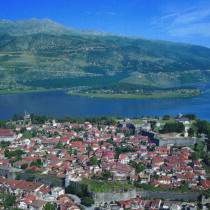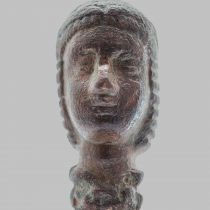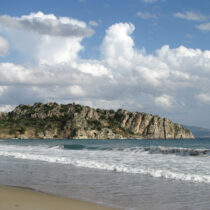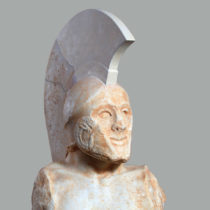Syria condemns illegal excavations by US, French and Turkish troops
US, French and Turkish troops and their agents are being accused by the Syrian Foreign Ministry for illegal excavations in archaeolical sites.
3D-printed reconstructions provide clues to ancient site
Part of the ancient archaeological site of Tiwanaku, Bolivia, believed by Incans to be where the world was created has been reconstructed using 3D printed models of fragments of an ancient building.
Chickens to be marker of Anthropocene
Consumption of chickens signals new geological epoch according to research led by the University of Leicester.
Photo of Vincent van Gogh turns out to be his brother Theo
A photograph that was long thought to be of the 13-year-old Vincent van Gogh has now been proven to be a portrait of his brother Theo van Gogh, aged 15.
The anatomy of the human heart in the “Madonna of the Pomegranate”
Striking similarities with the anatomy of the heart and the position of the fruit that Jesus holds level with his heart support the possibility of the hypothesis being well founded.
Alexander Lamont Henderson: 1904 Holiday Snaps
The Benaki Museum presents for the first time to the Greek public the work of the distinguished British photographer Alexander Lamont Henderson who visited and documented our country in early 1904.
The Top 10 Discoveries of 2018
Have a look at the ten most astonishing discoveries made by archaeologists around the world in 2018. A prehistoric thirst for craft beer: In an archaeological collaboration project between Stanford University in the United States, and University of Haifa, Israel, archeologists
2000-year-old Germanic cemetery discovered in western Poland
Polish archaeologists have discovered dozens of iron and bronzeartefacts including a sword and decorative buckles in a nearly 2000 years old Germanic cemetery.
CRE 2019 to be held at Madrid, Spain
The Symposium The 20th Current Research in Egyptology symposium will take place on 17–21 June 2019 at The University of Alcalá.
Rapid genetic evolution linked to lighter skin pigmentation
Populations of indigenous people in southern Africa carry a gene that causes lighter skin, and scientists have now identified the rapid evolution of this gene in recent human history.
From Stage to Museum. Chinese Opera Costumes
The exhibition presents fourteen Chinese opera costumes of fine workmanship accompanied by rich audio-visual material, and a spectacular costume of the ethnic group of the Miao.
Study upends timeline for Iroquoian history
New research from Cornell University raises questions about the timing and nature of early interactions between indigenous people and Europeans in North America.
Biggest mass extinction caused by global warming
The largest extinction in Earth's history marked the end of the Permian period, some 252 million years ago.
An ancient strain of plague may have led to the decline of Neolithic Europeans
A team of researchers from France, Sweden, and Denmark have identified a new strain of Yersinia pestis, the bacteria that causes plague, in DNA extracted from 5,000-year-old human remains.
Almost three million dollars for Einstein’s “God Letter”
The letter that was among other papers of Gutkind, went up for auction for the first time in 2008 and had been sold for £170,000.
Scientists found new giant dinosaur
The Volgatitan belongs to the group of sauropods — giant herbivorous dinosaurs with a long neck and tail, who lived on Earth about 200 to 65 million years ago.
The hominins of Sima de los Huesos are drawing ever closer to the Neanderthals
A comparison was made for the first time between the sample from the Sima de los Huesos site, in Atapuerca (Burgos), and dental samples from the Neanderthal site of Krapina, in Croatia, as well as with different modern human populations.
The whole of Africa was the cradle of Humankind
Two decades of field and laboratory research directed by Dr. Sahnouni have shown that ancestral hominins actually made stone tools in North Africa that are near contemporary with the earliest known stone tools in East Africa dated to 2.6 million years.
The excavations at Agios Sozomenos continued
This year the aim was to further investigate the pithos storage house on the small hillock at Ampelia.
The “interior designer” of Schliemann’s residence
139 years ago, on December 5, 1879, the Slovenian painter Jurij Šubic arrived in Athens after being invited by Heinrich Schliemann and Ernst Ziller.
Rethinking the history related to indigenous sites in northeast North America
Radiocarbon re-dating of contact-era Iroquoian history in northeastern North America.
Medullary bone found in Cretaceous birds
Report of the first occurrence of medullary bone in Enantiornithes, the dominant clade of birds during the Cretaceous.
There is no scientific proof that war is ingrained in human nature
Is it in our nature to go to war? Should we just accept the fact that humans have this innate tendency and are hardwired to kill members of other groups?
Archaeological exhibition “Treasures of the Middle Ages” in Athens
The exhibition "Treasures of the Middle Ages" from the State Archaeological Museumn of Warsaw opens today in the Byzantine and Christian Museum of Athens.




























